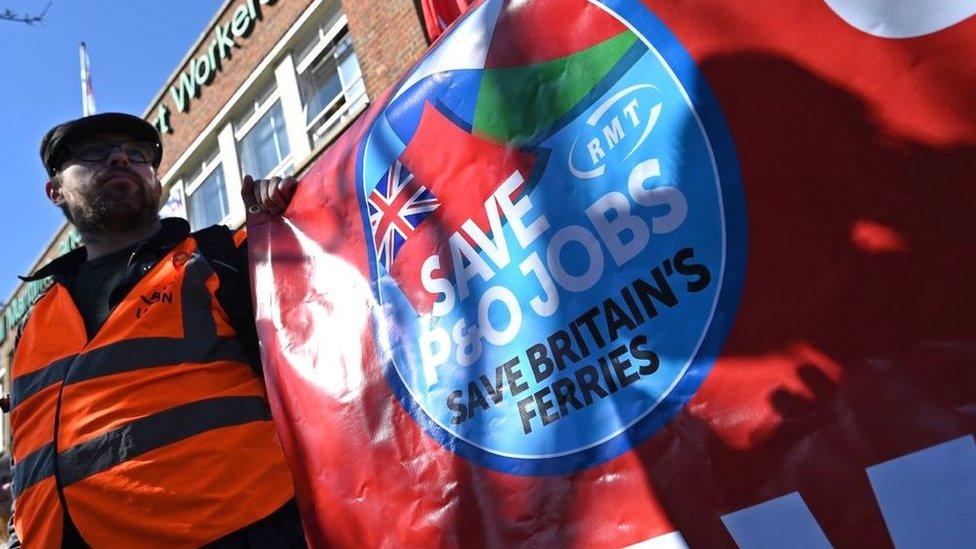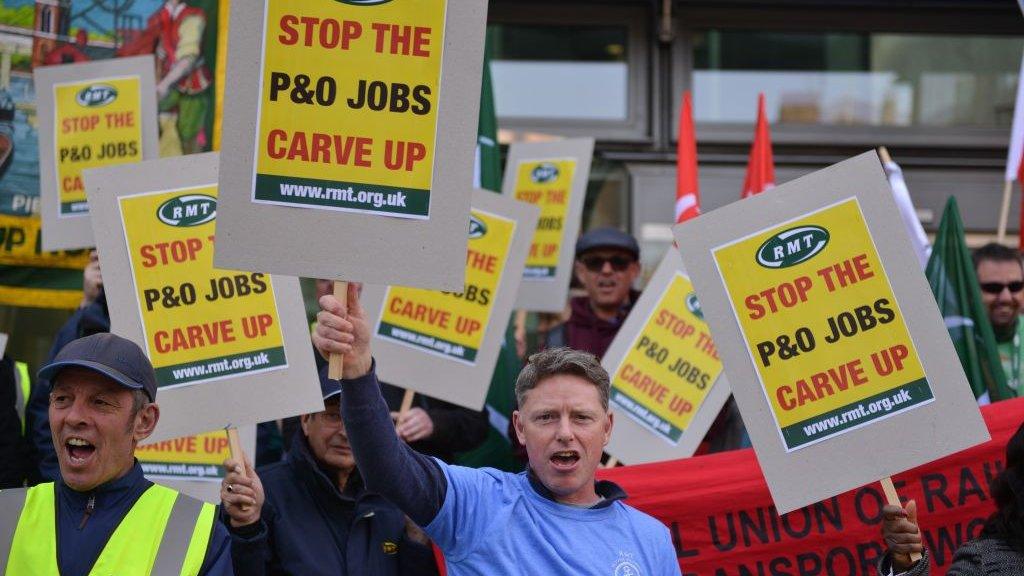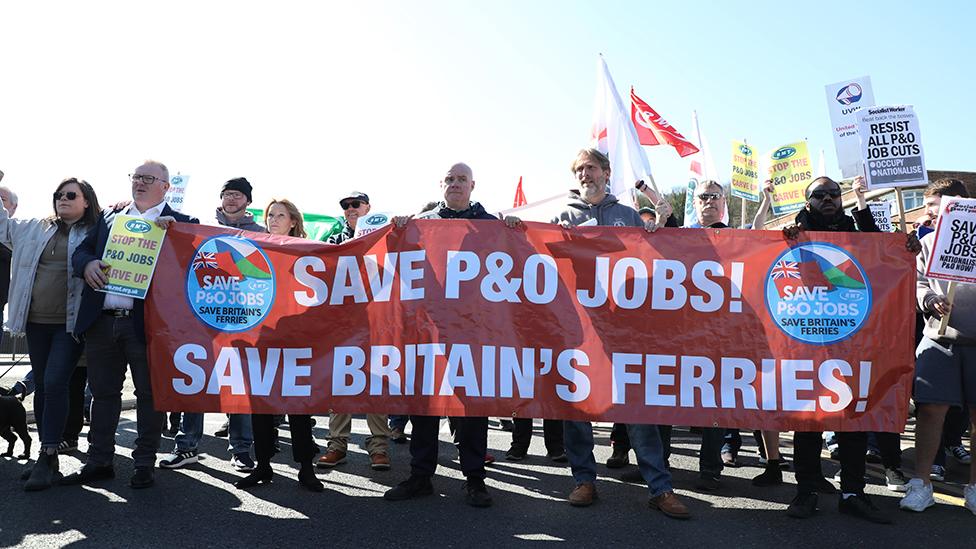P&O Ferries: New ferry pay rules won’t work, warn ports
- Published
- comments

British ports have described Grant Shapps' new pay plans for the ferry industry as "unworkable".
The transport secretary has urged ports to block ferries from docking if they do not pay their crew the UK minimum wage, with plans to create new laws.
The move comes after P&O Ferries sacked 800 of its staff without notice and replaced with them with agency workers.
But the boss of the ferry ports trade body raised concerns the government was "rushing to find a solution".
"The ports industry is genuinely sympathetic towards the situation of the impacted seafarers, however we would suggest that ports are not the competent authorities to enforce rules on employee salaries or working conditions in the shipping industry," Richard Ballantyne, of the British Ports Association, said.
The trade organisation covers more than 400 port facilities in the UK.
The UK Major Ports Group, the trade association representing large commercial ports in the UK, argued ports should not have to "be the police for the labour practices of ferry companies".
"We want to engage urgently and work with government to find a more effective and appropriate way of addressing the issues raised" by the P&O Ferries sackings, it said.
Unions also expressed disappointment that the plans didn't go far enough.
The Department for Transport said it is "engaging closely with industry to ensure that the new measures work effectively for all parties" and added Mr Shapps had written to all ports requesting their support.
Mr Shapps said he wanted to see British ports refusing access to ferry companies "who don't pay a fair wage, as soon as [is] practical".
The government will consult on the changes needed to make it a legal requirement, he added, but urged ports to take action "as soon as practical".
The UK minimum wage is £8.91 per hour for workers over 23. The average rate paid to the agency staff brought in by P&O Ferries is £5.50, which is in line with international maritime standards.
Mr Shapps set out a number of other measures in response to the P&O sackings, including plans to create "minimum wage corridors" on ferry routes between the UK and other countries.
The transport secretary has also asked the Insolvency Service to consider disqualifying P&O Ferries chief executive Peter Hebblethwaite from acting as a company director.
He said the announcement would force P&O Ferries to "fundamentally rethink" its sacking of 800 workers without consulting unions beforehand.
P&O Ferries drew outrage from politicians, unions and the public when it sacked hundreds of seafarers without any notice, replacing them with agency workers paid less than the minimum wage.
P&O Ferries boss Peter Hebblethwaite faces MPs
Mr Hebblethwaite admitted that the firm knowingly broke the law by not consulting with unions and planned to compensate workers instead.
Mr Shapps said that he would also take action to prevent employers using "fire and re-hire tactics" where the employer has not made "all reasonable efforts to reach agreement through a full and thorough consultation".
Mr Shapps said: "P&O Ferries' failure to see reason, to recognise the public anger, and to do the right thing by their staff has left the government with no choice.
"Where new laws are needed, we will create them. Where legal loopholes are cynically exploited, we will close them. And where employment rights are too weak, we will strengthen them."
But Nick Humphreys, an employment partner at Penningtons Manches Cooper, described the package as "weak".
"I don't think that these measures will have any affect whatsoever on P&O Ferries," he said.
"It's aspirational in a lot of places, it won't get workers their jobs back," he added, saying that nothing was likely to change for several months because of the need for consultation.
On asking ports to enforce pay rules, he pointed out that one problem was that there is no legal basis for turning away ships that don't pay the national minimum wage.
It could even mean that ports could be liable for damages if sued by a ferry operator, Mr Humphreys said.
Unions also hit out at the government's response, saying it was too little, too late.
Mick Lynch, the general secretary of the RMT union, said: "Despite all the bluster, Grant Shapps has failed to grasp the opportunity to adequately stand up to the banditry behaviour of P&O.
"The prime minister repeatedly said to parliament that the government would be taking legal action save British seafarers' jobs but he has failed to keep his word," he said.
Mark Dickinson, general secretary of the Nautilus trade union, said he broadly welcomed the measures announced but that they would not make P&O change course.
"P&O Ferries are already extolling that extending the UK National Minimum Wage to international ferry routes will not cause them to change direction and that their cheap labour agency-based crewing strategy will remain intact."


Ministers have condemned the actions of P&O Ferries in strong terms over the last fortnight.
Today's measures are designed to improve wages and protections for seafarers working for all ferry companies operating to and from the UK - not just P&O Ferries.
But they show the limits of what the government can actually do in this situation.
Sacked workers won't be offered their jobs back, nor will the change to using agency crew be stopped.
In an ongoing war of words with Grant Shapps, P&O Ferries' boss insisted reinstating fired workers would lead to the business collapsing.
Tomorrow's deadline for staff to respond to their severance offers will be looming large, with many of the measures announced today expected to take some time to come into effect. .

Related topics
- Published29 March 2022

- Published31 March 2022
